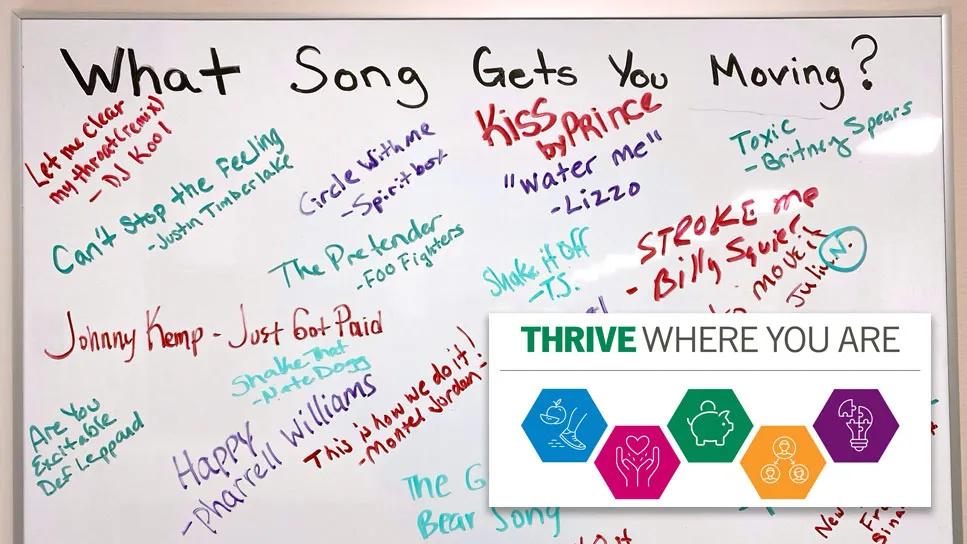A new tool offers micro-education for improving meeting productivity

Image content: This image is available to view online.
View image online (https://assets.clevelandclinic.org/transform/11756d6d-eb4f-4be8-bfcd-20be27f26b6b/25-CGO-6478108-THRIVE-BoosterSeries-2-CQD_967x544)
Whiteboard for Thrive participants
Earlier this year, Cleveland Clinic’s Revenue Cycle Management team, which manages financial operations for patient services, turned their expertise inward to personal expenses. Employees participated in a team savings activity, making a concerted effort to curtail personal spending. Collectively, they saved more than $1,000 in a month.
Advertisement
Cleveland Clinic is a non-profit academic medical center. Advertising on our site helps support our mission. We do not endorse non-Cleveland Clinic products or services. Policy
The activity was inspired by a Thrive Booster – a micro-learning tool created by Cleveland Clinic as part of its Thrive Where You Are program. Launched in 2023, the Thrive program features a variety of educational experiences – including boosters – to address the well-being of the organization’s 80,000-plus employees. It targets five key dimensions of well-being: physical health, emotional health, financial literacy, social connectedness and professional development.
The Thrive program has reached more than 5,000 caregivers through in-person roundtable discussions, a 60-minute virtual course and a self-directed, 10-minute eLearning module. As the program’s popularity grew, Jennifer Sauer, Program Manager of Thrive Where You Are, and Stephanie Wheeler, Program Manager for Employee Wellness, heard a common refrain from leaders after their teams participated in education: How do I make well-being a part of the ongoing conversation? That led to the creation of the Boosters.
“Thrive Boosters are designed to help a wellness champion or manager pick up the torch and bring well-being into the regular conversation,” Sauer says. “They are meant to be bite sized – to take place as part of a regular meeting or huddle, so something related to well-being stays on the docket.”
Sauer developed a set of six Thrive Boosters – one related to each of the five key areas, plus an extra one on the importance of taking vacation. Each one-page Booster includes a short educational piece on the well-being topic, a discussion prompt question, a suggested group activity and tips to support continued development and healthier habit-building.
Advertisement
For instance, the Thrive Booster related to emotional health discusses the importance of getting outside, then encourages team members to share a photo of their “happy place.” When the wellness champion for the Pain Management team at Cleveland Clinic Mercy Hospital presented the Booster to caregivers, she provided everyone with a scrapbook page and encouraged them to decorate it with photos. The unit then displayed the pages for everyone to see.
After a soft pilot in early 2025, Thrive Boosters rolled out enterprise-wide in May. They are available on Cleveland Clinic’s online educational portal. Sauer and Wheeler recommend that groups select one at a time, then work on the concept for a month, reiterating its importance. For instance, the Thrive Booster related to social connectedness discusses how sharing food is a universal way to strengthen bonds among people. Each week, a different team member could bring in their favorite dish and share the recipe.
“The teams that have used the Boosters have jumped all in,” says Wheeler. “You can’t just read the content during one huddle, post it and then expect people to be intentional about it. It needs to be reiterated for a few weeks.”
While Thrive Boosters promote individual well-being, they have an added advantage – fostering fellowship.
“Groups that use them have created more camaraderie on the team because they are routinely talking about things that aren’t work related – their happy places or favorite music,” says Wheeler.
This benefit emerged for one of the teams that piloted the Boosters. Nurse care coordinators at the Taussig Cancer Center began using Thrive Boosters at their monthly meetings.
Advertisement
“This group coordinates care for people who are very ill or terminal. They develop relationships with patients, some of whom they lose,” says Sauer. “One of the anecdotes we heard from the care coordinators is that it’s important to have the time and space to talk about something other than work. Talking about a recipe their grandma used to make for five minutes adds levity to the meeting.”
Thrive Boosters can be deployed to virtual, hybrid or onsite teams, both clinical and non-clinical. Sauer says they are a great tool for “unwired” caregivers who don’t have a lot of time to take a course or be part of roundtable discussion. Her team hopes to create a new set of Boosters each year. Sauer shares her sales pitch for Boosters:
“Are you looking for something to incorporate in a meeting or huddle to get your team thinking about their well-being and self-care? Do you want to build team bonding with something creative? Pick one of the Thrive Boosters.”
Advertisement
Advertisement
Making a difference by putting empathy into action
A look at how personal stories sparked an enterprise-wide cultural reset
Interdisciplinary program fosters high-performance teams
1:1 guidance benefits individuals and organization
Strategies for building connections, staying present
Annual event galvanizes leaders and inspires excellence
Expert tips from Cleveland Clinic’s Chief Legal Officer
Groups move the metrics in environmental services and sterile processing